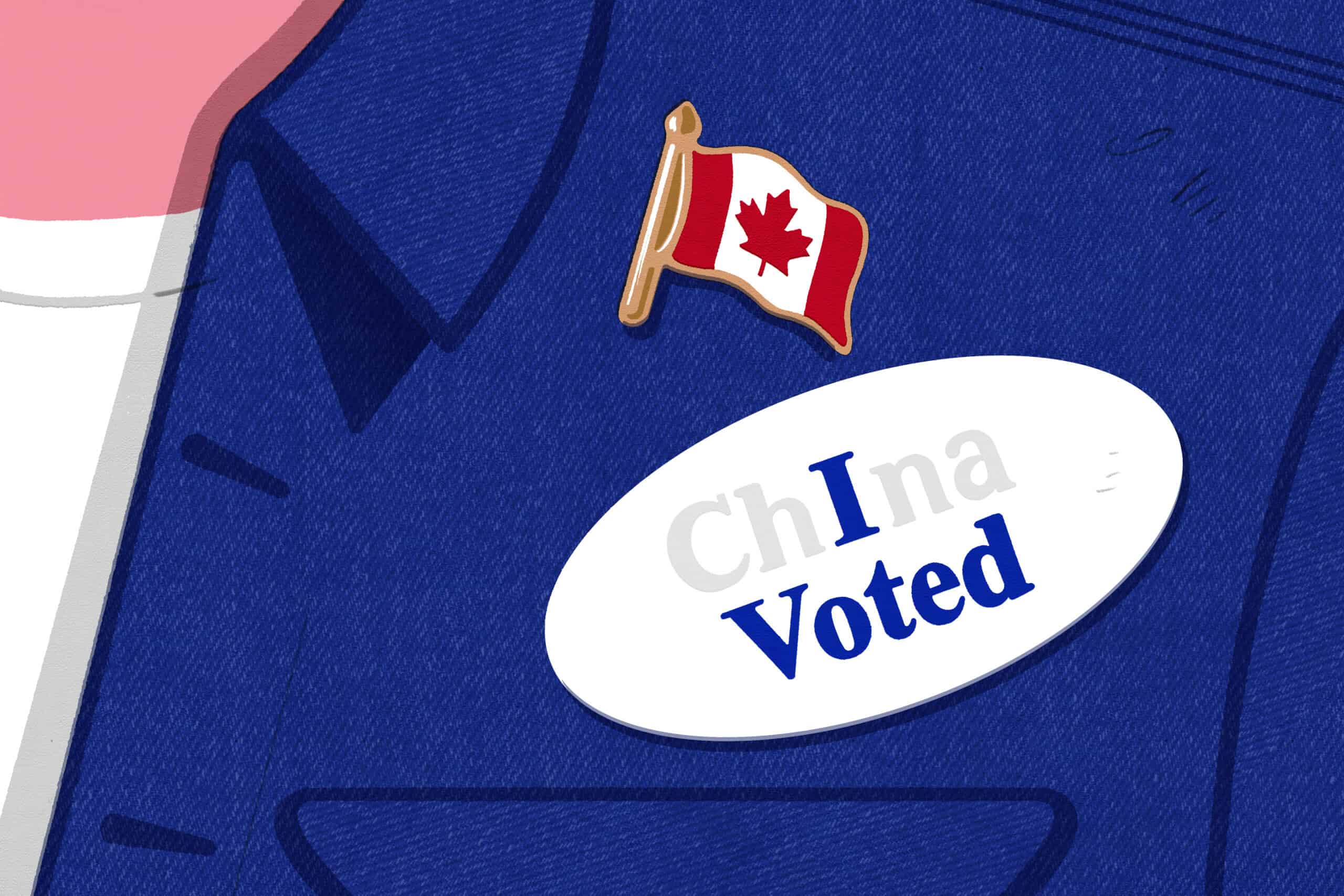John Bolton, 71, served as President Trump’s National Security Advisor between 2018 and 2019, working with the White House on some of the toughest challenges facing U.S.-China relations, including the effort to arrest Huawei’s chief financial officer, Meng Wanzhou, by asking the Canadian authorities to detain her at the airport. He is a long-time foreign policy hawk and has advocated strong measures, including the invasion of Iraq, to bring about regime change. Last week, we asked the former Ambassador to the United Nations under President George W. Bush to talk about his recent experience working in the White House on issues related to China and his new book, The Room Where It Happened: A White House Memoir. What follows is a lightly edited Q&A.
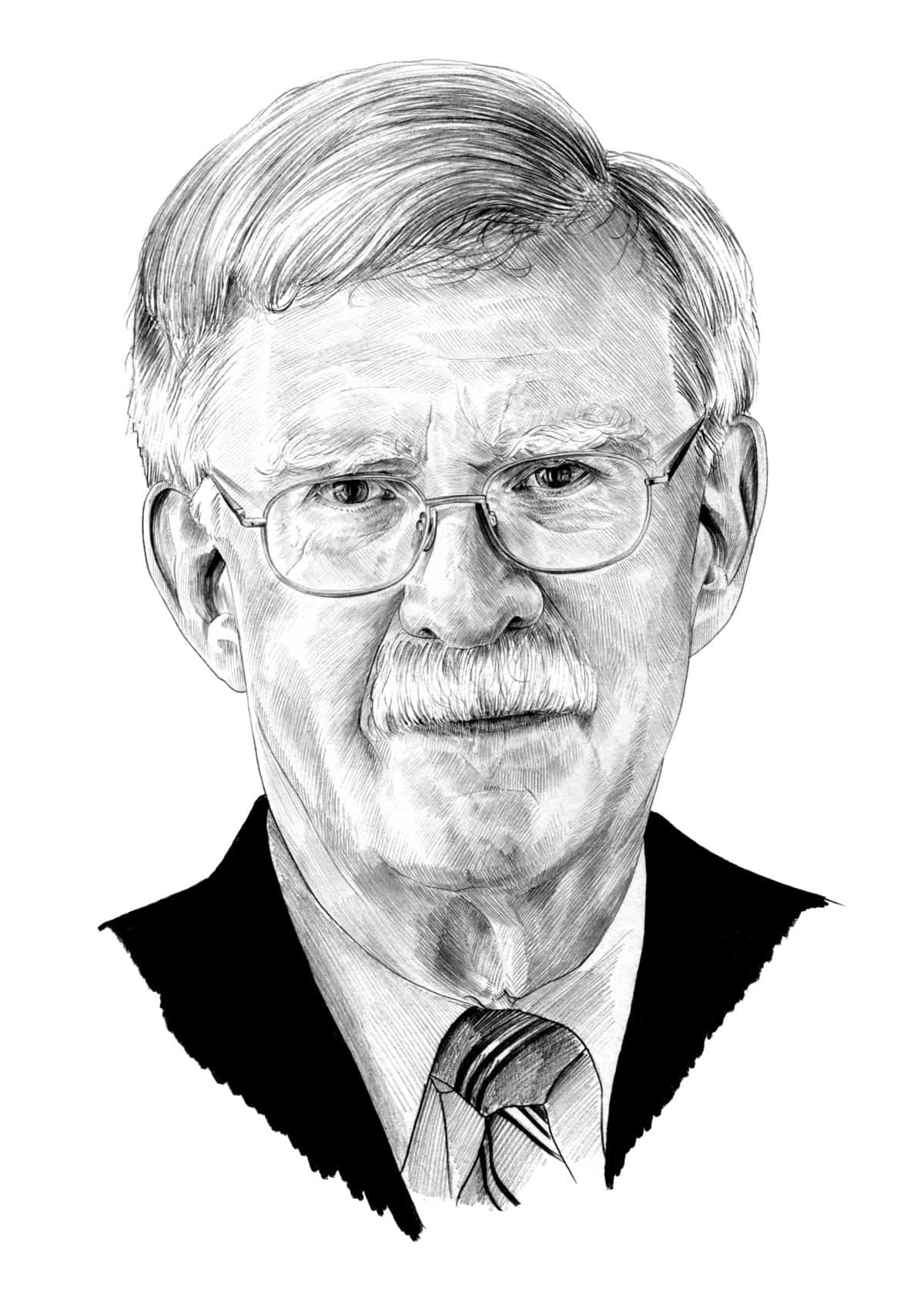
Illustration by Lauren Crow
Q: In Dec. 2018, Meng Wanzhou, the CFO of Huawei and the daughter of its founder, was arrested in Vancouver, Canada, at the request of the U.S. Justice Department, which is seeking to have Meng extradited to stand trial here for helping the company violate U.S. economic sanctions against Iran. There have been news reports that you were somehow involved in that decision. Can you say anything about her arrest, or your role in the case?
A: I’m a lawyer — that’s true — but I didn’t spend my time as National Security Advisor [2018 to 2019] as a junior FBI agent. This [the decision to request the arrest of Meng Wanzhou] was a matter handled by the Department of Justice, and the timing of the apprehension in Vancouver had more to do with her travel schedule and the way the case was being handled by the Justice Department. There’s nothing more to it than that. We obviously needed a country that had an extradition treaty [with the United States]. The hardest thing in any extradition proceeding is the dual criminality effect. And so because of the similarity of the financial fraud laws in Canada and the United States, it was a perfectly logical place to do it. It was also important because of the nature of the fraud involved, which is typical of the way a lot of Chinese companies take advantage of American markets. [In the U.S.] we do not have the kind of transparency into the financial books of Chinese companies and records systems that we do for an American company, particularly one that is listed on an American [stock] exchange. That’s a serious problem. This [Huawei case] was just an example of the kind of fraud that needs a serious response.
Huawei has long been suspected of ties to the Chinese military. It has been blocked repeatedly from entering the U.S. in a major way. But the U.S. government’s actions have only really kicked into high gear in recent years, even pressing U.S. allies to drop Huawei from their 5G plans. Why is that? What happened?
There are two separate issues here. First, Huawei, like many Chinese national champions, has benefited from a system of subsidies and favorable treatment by the Chinese government. And that has allowed them to be more competitive selling hardware and software in the U.S. and around the world. Huawei is deeply ingrained in the third [3G] and fourth generation [4G] telecom systems in the western [U.S.] states and rural areas because of the long distances involved [in delivering telecom services]. It’s hard to make money on a per mile basis of cable. But Huawei was always able to bid below its competitors because the Chinese government was helping them. So that’s a concern. For many years, we didn’t pay much attention to it, and the Europeans didn’t pay much attention to it either, and neither did other countries. In a way, Australia and Canada were maybe more concerned about it than we were.
| BIO AT A GLANCE | |
|---|---|
| BIRTHPLACE | Baltimore, Maryland |
| EDUCATION | Yale College, Yale Law School |
| POSITION | Former Assistant to the President and National Security Advisor (April 2018–Sept. 2019) |
| FAMILY | Wife Gretchen and daughter Jennifer Sarah |
But to answer your question more specifically, what really changed was the fifth generation telecoms issues [5G networks], and the security issue that fifth generation architecture raises. I’m certainly no technical expert, so I’m probably over my skis here — but in earlier generations of telecoms, you had more hub equipment and hub activity [working with] peripheral activity or networks. And so the argument, in security terms, was if you protect your core telecoms infrastructure, you can mitigate the risk of the loss of the data or even infiltration, or cyber hacking.
One of the big technological changes in fifth generation is that the distinction between core and periphery is not eliminated but dramatically reduced. That’s one reason why the fifth generation is faster. It’s more of a distributed network and less of a periphery network. What that means is that it’s much harder to fence out a threat like Huawei represents. And the experts would tell you, at least our experts would say, there is no adequate way to protect or mitigate against the threat from Huawei, which can be anywhere in your system. Because of the risk with this type of infrastructure, the only safe way is to say, “No” to Huawei. And that alone doesn’t even solve it in the fifth generation, because all these things are built on platforms that were built there before. So, somewhere down in the infrastructure could be Huawei’s third generation software [systems]. And at some point, you’ve got to rip that out too, which is why all of this intimidates so many people because the cost and the effort involved [in rebuilding the networks and replacing old software] are so great.
Watch John Bolton’s response on Huawei and 5G network security.
There is another Chinese telecom giant you deal with in your book, ZTE, which also ran into trouble with the authorities for violating U.S. sanctions. The company was originally financed by a Chinese military company but has operated for more than a decade in the U.S. The Pentagon recently released a list of Chinese firms affiliated with the Chinese military. Many of them, like ZTE, have had partnerships or joint ventures with American companies. How was ZTE able to operate in this country if they are a threat to national security?
This really got started, at least in my tenure [as National Security Advisor], when the Commerce Department and Wilbur Ross went after ZTE [for repeatedly violating U.S. sanctions]. Trump gave that away to Xi Jinping. I recount that in my book. In the past four or five months, the Pentagon has resisted some of the additional sanctions and steps that wanted to be put in place because of this dependency on Chinese companies that had built up over the years. And this is part of the problem. The interconnections are so substantial that when you say, “We’re going to get rid of this,” that’s not an easy thing to do. And it’s not cost free.
But I’ll just give you an example. We were in Singapore for the first summit between Trump and Kim Jong Un, and we have this MiFi device. It’s a little [WiFi-like] hotspot you carry around with you. I don’t have one now, but in the government, they gave us a MiFi in Singapore so that we wouldn’t be connected to the hotel WiFi or the computer network [in Singapore]. This MiFi hotspot would increase our security by being independent of the network. I’d never had a MiFi before. So I take the little thing out, and I turn it around. And on the back of it, in big letters, it says “ZTE.” Oh, for God’s sake. This is the White House that is giving me this. This is our security! This is what I mean by coming late to this type of thing. Well, it’s no criticism of the U.K. or anybody else. There’s plenty of criticism we can level against the United States for just not understanding what the Chinese government has been up to these many years.
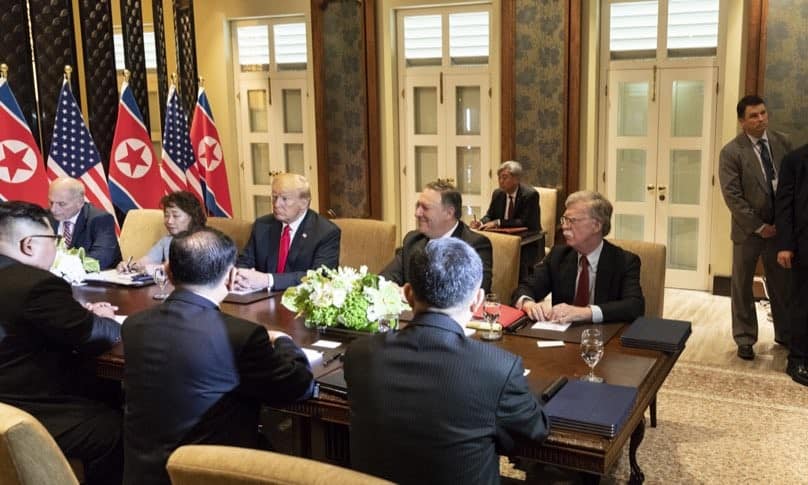
Credit: Dan Scavino
Does the U.S. government have any process in place to guard against this happening in the future? Or even to understand which companies are a serious threat?
Well, if I were at the NSC [National Security Council], I would be sure that that is exactly what we were doing. There are review processes in the Commerce Department. But I think one of our problems is that the enforcement or the gathering of information that you need — and what happens even before that — is very disjointed and disorganized. The FCC [Federal Communications Commission] has a role in the telecoms area, obviously. There are a lot of parties that are interested. And now, the red flags are up. So a lot of people are working on it. But I couldn’t tell you from my own personal knowledge that we’re doing it in the most systematic fashion.
The U.S. has a fast-growing “Entity List,” which bars U.S. firms from exporting to certain foreign firms over national security and even in some cases human rights violations. The U.S. has also begun sanctioning Chinese officials. Has there been any talk of looking at the wealth of China’s political elite? Has that ever been on the table?
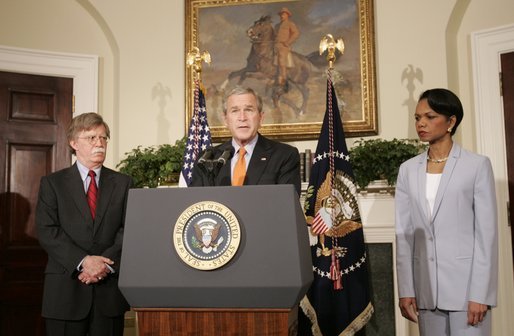
Credit: White House photo by Paul Morse
Well, I think there are a lot of things being talked about. You probably saw the speculation about banning Chinese Communist Party members from traveling to the United States, which would knock out a lot of people. But the danger here is that, number one, I don’t know if Trump is reelected, what he’s going to do after election day. All of this may disappear when he calls Xi Jinping and says, “let’s get back to the trade negotiations.” And the fact is, the sanctions approach — in part, during the [George W.] Bush ’43 administration, especially in the Obama administration, and to a considerable extent still in the Trump administration — focuses on naming companies and individuals. This is a mistake. The way you use sanctions effectively is in blanket fashion. One example of that is after Saddam Hussein invaded Kuwait in 1990. The sanctions that were imposed on Iraq through the [U.N.] Security Council were huge, sweeping sanctions. This was not company ABC or company XYZ, but all Iraqi companies. And that’s the way to do it. That’s the way you make China sit up and take notice. Individual sanctions, episodically applied, do not impose maximum pressure. And they give China or any target of the sanctions a chance to mitigate and minimize the influence. So you can read about all these sanctions being applied, but unless they’re applied more systematically, more thoroughly and more immediately, the punitive effect of the sanctions is watered down. People should not be deceived by [an announcement that] 20 more sanctions were imposed on China. When you just say: “No Chinese telecommunications equipment is going to be imported into the United States” — that’s a blanket sanction.
Now, one response to that is, “But my God, that’s going to hamper American companies, because they’re reliant on China for their supply chains.” And all that’s true. That’s why this phenomenon of decoupling becomes so important now. Who let our supply chain, in so many different ways, become so dependent on components coming out of China? All that’s going to be re-examined, and frankly, it’s now being re-examined in Japan and the European Union too.
Who let our supply chain, in so many different ways, become so dependent on components coming out of China?
Can we talk about the Hong Kong National Security Law? What is at stake for the U.S. in Hong Kong?
What’s happening in Hong Kong is really a demonstration of China’s lack of concern for international agreements. They’re the ones who committed to the “one country, two systems” approach. And now, roughly halfway into it, they’re junking that. From a national security point of view, that should tell us about China’s commitment to international agreements. It also means that for American companies, the rule of law in Hong Kong, which was always one of the big advantages in all of Asia, [is gone]. Look, this was a British commercial law system, run by judges who may have been Hong Kong citizens but many of whom trained at British universities. They knew this legal system as well as American lawyers or British lawyers. People had confidence in the independence of the Hong Kong judiciary. The police force was corruption free. I mean, it was an oasis. That’s not going to be true anymore. This proves something [the conservative economist] Milton Friedman said back in the mid 1990s. He said, “This handover is going to mean that either Hong Kong becomes more like China or China becomes more like Hong Kong.” And obviously that’s what is happening — the former unfortunately.
One question is: Why is China doing this? Why is it prepared to take this hit [to its international standing]? You can see The New York Times just announced it’s taking a lot of its operation out of Hong Kong to Seoul. I have [something about Hong Kong] in my book. Dan Quayle gave me this statistic in October 2018: At the time of the handover, in 1997, Hong Kong’s economy amounted to 20 percent of China’s overall economy — 20 percent! Today, it amounts to 2 percent. Now, when you whack 2 percent of your economy, that’s a hit that nobody wants to take. But that’s an order of magnitude different from 20 percent of your economy. The calculus to the Chinese [government] is, “Go ahead and hate us for ending the ‘one country, two systems’ deal in Hong Kong. It doesn’t matter to us. This virus that Hong Kong represents is too dangerous to allow it to go unchecked.”
In your book you also recount that former Vice President Quayle talked to you in 2018 about the Chinese government kidnapping businessmen from Hong Kong. We know that the billionaire financier Xiao Jianhua, who held a Canadian passport, among others, was abducted in Hong Kong. Were there lots of other Chinese businessmen taken?
Well, yes. Remember the thing that kicked off the demonstrations in Hong Kong was the so-called extradition law, which would have made that sort of thing [Chinese security agents arresting people in Hong Kong] legal. People understood that if they can grab you in Hong Kong and take you deep into the mainland, that’s a fundamental restriction on your freedom. That’s what provoked the demonstrations. Obviously, they broadened after that, but most people would say, “Well, why should an extradition bill make a difference?” And that’s the answer.
The U.S. seems to be stepping up the pressure on China at a time when a large chunk of the world’s global supply chains are sitting inside China? We get our electronics there, our medical equipment, our antibiotics. Isn’t that a huge risk?
The question is: Do you want to try and start changing that now, or would you rather wait until it gets worse, in 10 years? This shows that both the American private sector and the [U.S.] government did not pay attention to political risk while all this was happening. Look, I’m a free trader. I’ve always supported free trade. Who cares whether you manufacture in Mexico or Ecuador or Vietnam or China or somewhere in the United States, if it’s economically more beneficial? Manufacture where your costs are lowest. But there’s a difference between manufacturing in South Carolina and manufacturing in China. And that difference is now coming home to roost. People just didn’t pay enough attention to it. So, as I said, it’s never going to be a good time [to take action] given the level of the mistakes we’ve made for 30 or 40 years, but we should try to fix it.
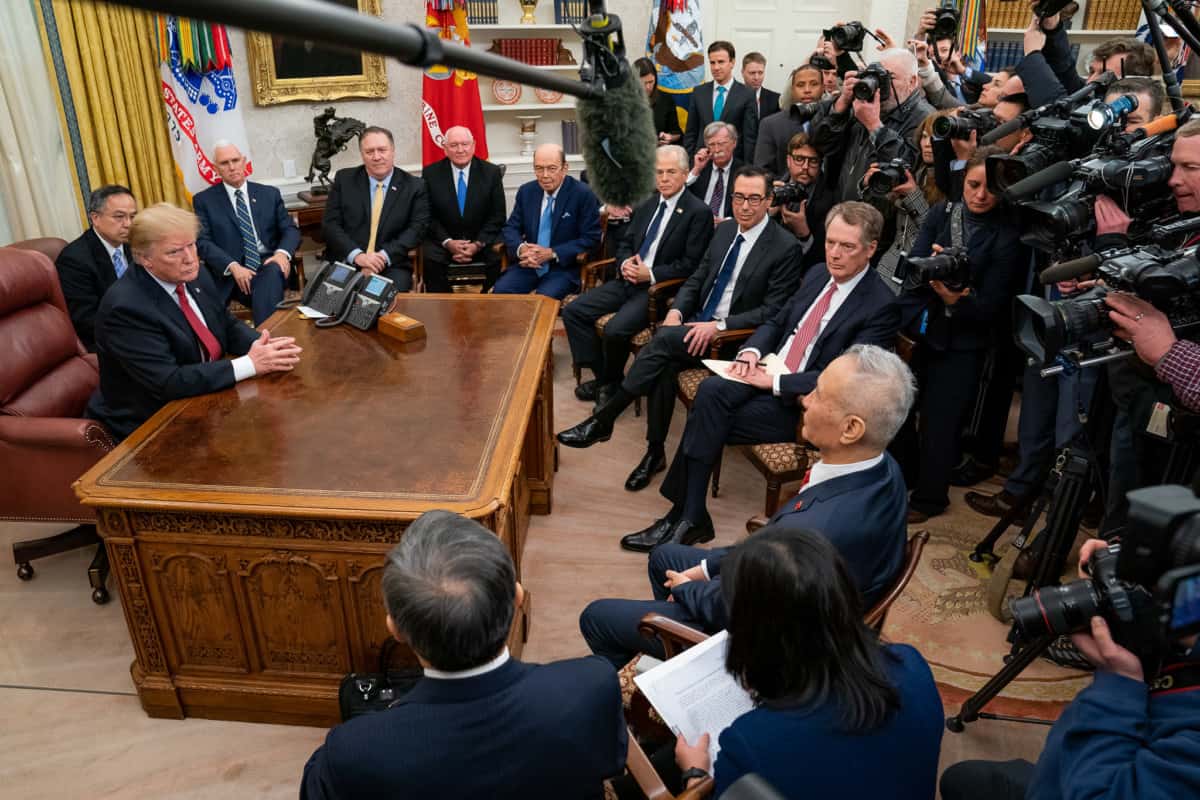
Credit: Official White House Photo by Tia Dufour
I don’t see evidence that [American or global] companies are uprooting their supply chain and bringing it home. They’re just not allocating as much [to manufacture overseas] in their capital allocation decisions. They’re not [putting more manufacturing capacity] into China. And they’re going to their suppliers to say, “You shouldn’t do anything more in China.” There’s less new investment [in China, from the U.S.]. And when there’s a question about modification [of the global supply chain], people say, “Well, why don’t we set up in Vietnam or Indonesia, or Central America?” That’s what’s going on. And as a long term supply commitment of 10 years comes to its end, executives [might] say, “Well, instead of renewing in China, in three years, let’s renew somewhere else.” The amount of movement at this moment is not that great, but the cumulative effect is going to be substantial.
How would you characterize what is taking place now between the U.S. and China? Are we in a New Cold War, or engaging in economic warfare against China?
I don’t like the phrase “cold war.” The Cold War was an ideological struggle. And it followed, in a way, from World War I and World War II. This is much more of a pre-modern or pre-19th century struggle. The extent of the economic interrelationship [between the U.S. and China] makes it different, even from those [earlier] conflicts, where there was typically not much [of an] economic interrelationship. In Rome, the barbarians wanted in, and the Romans didn’t want them in. So, that adds another dimension to it. But I don’t see it as ideological. I do see it as two completely different kinds of social systems fighting with each other; that may take on an ideological complex. But it’s also the [case that the] rest of the world sees this more from the United States’ point of view. And certainly, that was not the case during the height of the Cold War in the ’50s and ’60s and ’70s.
Would you say our differences are primarily economic?
It’s important for Americans to understand it is not just the economic side. It’s not just the economic struggle. It’s also about how you want your society organized. You tell Americans about the repression of the Uighurs or the repression of Falun Gong, and they see what’s happening in Hong Kong. And you tell them about the social metrics project in China, where they measure all these different things about you to tell you whether you’re a good citizen or not; and the future of [China’s] civil-military fusion. You’re talking about a completely state-dominated kind of society. If that’s what the future of China holds, that isn’t what anybody in any of the world’s industrial democracies wants to see. That’s why Hong Kong is such a threat to China because [the people of Hong Kong] don’t want social metrics. They don’t want civil-military fusion. They want what they see as a free society. And the biggest mistake the Hong Kong demonstrators might have made is not to get demonstrators in Shanghai and Beijing to be doing the same thing. Whether they had [the opportunity to do that], we don’t know but that’s how China reacts to dissent inside China. The more people understand that, the harder it’s going to be to find people with a sympathetic view of China.
In your book, The Room Where it Happened, you also say that China influenced the 2018 midterm elections to a greater degree than the Russians influenced the 2016 presidential election. Can you say something about what they were doing?
That’s what one of our intelligence officials said. I wish I could claim authorship of that, but it was somebody else. You know, if you look at the [Vice President Mike] Pence speech, it involves some information we declassified. And then, more recently, [NSC deputy director] Matt Pottinger gave a speech, in Mandarin no less, though the text is available in English. Our idea for the Pence speech was that this was going to be the beginning of laying out a broader description of the threat that China poses. But it’s obvious that their activities in the United States go far beyond just the interference in the [2018] election. They were [even] trying to influence the overall dialogue, buying supplements in The Washington Post every week.

David Barboza is the co-founder and a staff writer at The Wire. Previously, he was a longtime business reporter and foreign correspondent at The New York Times. @DavidBarboza2


